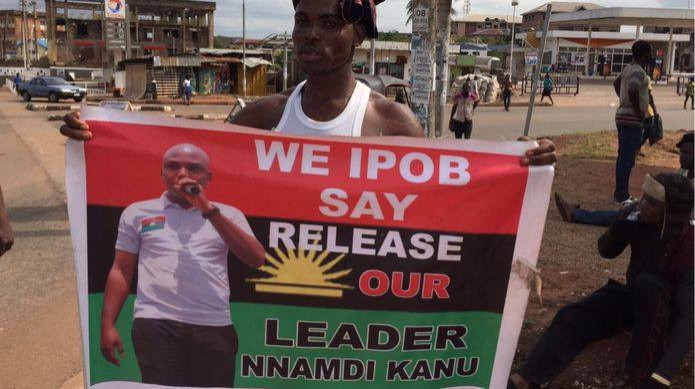Nigeria: State 'obtains court order' to detain Biafran leader Nnamdi Kanu for next three months

The Nigeria State Security Service (DSS) has allegedly obtained a court order allowing it to detain Radio Biafra director Nnamdi Kanu for 90 days. The statement was made by Kanu's lawyers, Ogechukwu Vincent Obetta, days after the DSS said Kanu had been released.
Kanu is the leader of the Indigenous People of Biafra (Ipob) and was apprehended in Lagos in October on charges of criminal conspiracy, intimidation and belonging to unlawful society. He pleaded not guilty to the charges.
Ipob and other pro-Biafrans call for the independence of territories that constituted the Biafran Republic, established in 1967 and re-annexed to Nigeria in 1970, following a civil war that claimed between one and three million lives. Supporters of the Biafra cause hold regular marches − which they call evangelisations − across several states in southern Nigeria, mainly inhabited by the Igbo ethnic group. Protests have intensified in the past few days in Nigeria and other states since Kanu was arrested.
Shortly after Kanu's arrest, the Nigerian government and the DSS claimed he had been released on bail, however, his lawyer Vincent Obetta confirmed to IBTimes UK that he was still being held by the DSS. The same allegations were made by members of a leading NGO in Abuja and an intelligence source, who both spoke to IBTimes UK on condition of anonymity as they had not been authorised to publicly comment on the issue.
Kanu failed to appear in court on 18 November, amid allegations the DSS prevented him from attending the hearing. Obetta said in an interview with the Biafran Herald that while he was in court, the prosecutor gave him a document containing a court order permitting the DSS to detain Kanu for the next three months to "conclude what they said was an investigation of terrorism and terrorism financing".
Obetta also said he has filed contempt proceedings against the DSS. IBTimes UK has repeatedly tried to contact the DSS in the past few days for a statement regarding Kanu. A person who did not disclose his identity said on 18 November he could not comment nor provide a number for the appropriate department to contact for a statement. The person then said "call this number tomorrow" and hung up.
The DSS was contacted again on 19 November but a person, who did not disclose his identity, said the only way to obtain information was for an IBTimes UK reporter to go to the office in Abuja. The DSS has continued to withhold comments at the time of publishing.
Nigeria up close: Check out our Flipboard magazine
Biafra's History
After the end of British rule in 1960, Nigeria consisted of territories that were not part of the nation before colonisation, resulting in escalating tensions among the communities.
People in the Eastern Region − a former federal division of Nigeria with capital Enugu − mainly from the Igbo tribe, wanted to secede due to ethnic, religious and economic inequalities with other tribes in Nigeria. The Eastern Region declared independence and proclaimed itself the Republic of Biafra following two coup d'etats in 1966 .
The fact that Nigeria's oil was located in the south of the country played a major role in the eruption of the war, during which medicine and food shortages in Biafra led to the deaths of millions of people.
Biafra has been commonly divided into four main "tribes" − the Igbos, the Ibibio-Efiks, the Ijaws and the Ogojas. The modern-day states that make up Biafra from the eastern region and midwest are: Anambra, Enugu, Imo, Delta, Bayelsa, Abia, Cross River, Akwa-Ibom, Rivers, Ebonyi, southern part of Ondo State, Igbanke in Edo State and southern part of Benue State.
© Copyright IBTimes 2025. All rights reserved.






















